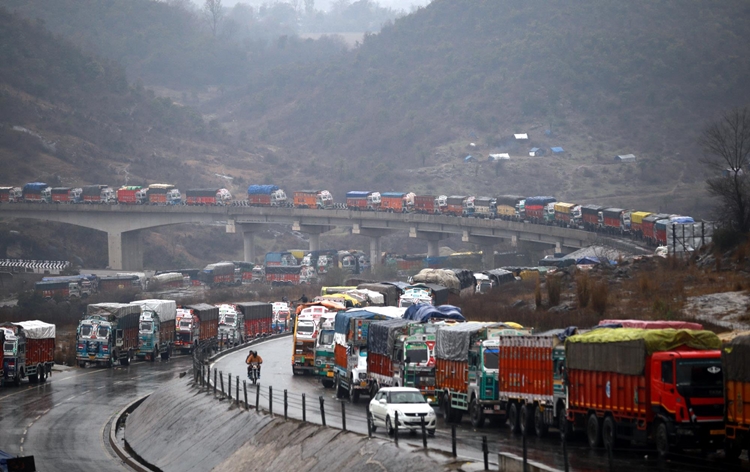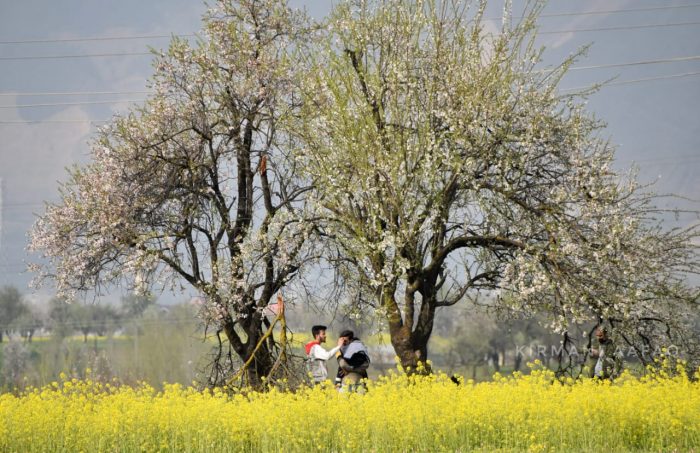Apple trade rots roadside as tourism revenue vanishes in flood-hit season
By: Javid Amin | 03 Sep 2025
A Valley at the Crossroads
Kashmir, often romanticized as “Paradise on Earth”, is today battling a harsh economic reality. Beyond its scenic beauty, the Valley survives and thrives on two major pillars: horticulture and tourism. These industries are not just sources of income; they are lifelines supporting nearly every household, directly or indirectly.
Yet, in recent months, these twin engines of Kashmir’s economy have faltered simultaneously. A combination of highway closures, erratic weather, and mass tourist cancellations has triggered an economic domino effect. Farmers, traders, hoteliers, artisans, transporters, and small shopkeepers find themselves staring at mounting losses.
This article takes a deep dive into the crisis, uncovering the real stories behind numbers, the hidden struggles of people, and the long-term implications for the Valley’s fragile socioeconomic fabric.
Apple Industry in Distress: When Highways Turn Hostage
The apple trade in Kashmir is not merely about fruit—it is the heartbeat of the Valley’s economy. With over 70% of India’s apples coming from Kashmir, the sector sustains nearly 3 million people, from orchard workers to transporters.
But this year, growers are facing an unprecedented crisis.
1. The Highway Blockade: A Farmer’s Nightmare
The Jammu–Srinagar National Highway, Kashmir’s arterial trade route, remained shut for nearly a week due to landslides and continuous rains. For an industry dealing with perishable commodities, each passing hour translates into irreversible losses.
-
Bagogosha pears and Gala apples rotted on stranded trucks, their freshness fading into waste.
-
Farmers helplessly watched investments wither away, with losses estimated at ₹200 crore in just days.
-
The highway blockade also disrupted supply chains beyond Kashmir, affecting traders in Delhi, Mumbai, and southern states who rely heavily on timely apple shipments.
2. Sopore Fruit Mandi: Asia’s Apple Hub Slows Down
The Sopore Fruit Mandi, Asia’s second-largest fruit market, usually witnesses 100–150 truckloads of apples dispatched daily during peak season. This season, only a handful of trucks could move.
The mandi, once bustling with negotiations, now wears a deserted look. The silence reflects the anxiety of traders, who know that unsold apples not only lose value but also impact the next cycle of trade.
3. Prices in Freefall: The Harsh Economics of Spoilage
Before the crisis, a box of American apples fetched ₹600. Today, the same box barely sells for ₹400–₹450.
-
A truckload valued at ₹15 lakh is now recovering just ₹1–2 lakh due to spoilage.
-
Traders face cash flow disruptions, making it difficult to pay farmers and laborers on time.
For a farmer who has invested year-round in fertilizers, pesticides, and labor, this drop in price feels like betrayal.
4. Mughal Road: A Partial Relief That Falls Short
Authorities allowed limited movement of trucks via the Mughal Road, a secondary route. But its narrow, hilly terrain and weather vulnerabilities make it insufficient to absorb the full trade volume.
Farmers are being advised to delay harvesting or use Controlled Atmosphere (CA) storage, but small growers lack access to such facilities. The imbalance widens: while big orchard owners may salvage produce, marginal farmers risk total wipeout.
Tourism Collapse: From Full Bookings to Empty Rooms
If apples are Kashmir’s backbone, tourism is its face to the world. It fuels hospitality, crafts, transport, and local commerce. In 2022, Kashmir recorded nearly 2 crore tourist arrivals, giving hope for a post-pandemic revival.
But nature had other plans this year.
1. Rains, Landslides & Red Alerts
Torrential rains, cloudbursts, and continuous landslides disrupted connectivity, leading to red alerts across the Valley. Safety concerns triggered mass cancellations, leaving hotels and houseboats vacant during what should have been peak season.
2. Hospitality in Ruins: Hotels & Houseboats Go Empty
-
Hotels in Srinagar, Gulmarg, and Pahalgam reported up to 70% booking cancellations.
-
Luxury houseboats on Dal Lake, usually full with honeymooners and foreign tourists, remain docked and idle.
-
Food suppliers, laundry services, and guides linked to hotels are equally impacted.
3. Transport Sector: Engines Turn Silent
Taxi unions and tourist bus operators, who rely on peak-season earnings to survive lean months, face massive losses. Idle vehicles line up on roadsides—a stark symbol of halted mobility.
4. Handicrafts & Bazaars: Artisans Without Buyers
Kashmir’s famed Pashmina shawls, papier-mâché crafts, and carpets depend heavily on tourist footfall. With markets deserted, artisans struggle to sell even at reduced prices. The cascading effect is evident in:
-
Reduced wholesale orders.
-
Families pulling children out of private schools to cut expenses.
-
Young artisans abandoning traditional crafts in search of alternate jobs.
The Socioeconomic Domino Effect
When apples rot and hotels go empty, the shockwaves ripple through Kashmir’s fragile economy.
-
Farmers lose income, reducing their purchasing power.
-
Traders and transporters default on loans taken to finance seasonal operations.
-
Small shopkeepers in local markets see reduced footfall.
-
Daily wage laborers—the invisible workforce—lose out entirely.
This is not just an economic crisis; it’s a social crisis that threatens the stability of families, education, and healthcare in the Valley.
Expert Perspectives: Why This Crisis Matters Nationally
Economists warn that Kashmir’s troubles should not be viewed in isolation.
-
National Food Supply Chain: With Kashmir producing the bulk of India’s apples, disruptions lead to shortages and price hikes in other states.
-
Employment Impact: Horticulture and tourism collectively employ millions, both directly and indirectly. Prolonged disruption risks large-scale unemployment.
-
Regional Stability: Economic hardship in a conflict-prone region can worsen tensions, fueling unrest and migration.
The Road Ahead: Can Kashmir Rebound?
While the crisis looks grim, experts suggest actionable strategies:
-
Infrastructure Investment: Building all-weather highways and expanding rail networks to reduce dependence on the Jammu–Srinagar Highway.
-
Cold Storage Expansion: Affordable Controlled Atmosphere storage units accessible to small farmers.
-
Tourism Diversification: Promoting off-season tourism, adventure sports, and cultural tourism to reduce seasonal dependency.
-
Digital Integration: Online marketplaces for farmers and artisans to bypass physical bottlenecks.
-
Disaster Preparedness: Better forecasting, flood management, and insurance schemes for crops and businesses.
Bottom-Line: A Valley That Refuses to Surrender
Kashmir’s economy is caught in a storm—quite literally. Apples are rotting on roadsides, and tourists are fleeing before arriving. Yet, amid despair, there remains resilience. Farmers continue tending orchards, hoteliers are re-strategizing, and artisans are adapting their crafts for online buyers.
The crisis has exposed vulnerabilities but also highlighted opportunities for reform. If timely interventions are made, Kashmir can transform this setback into a foundation for a more resilient, diversified, and inclusive economy.



